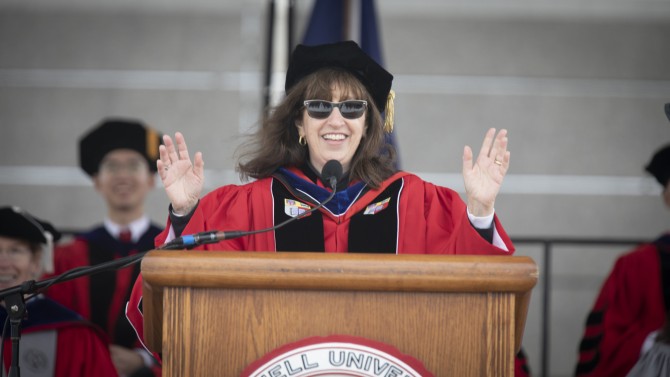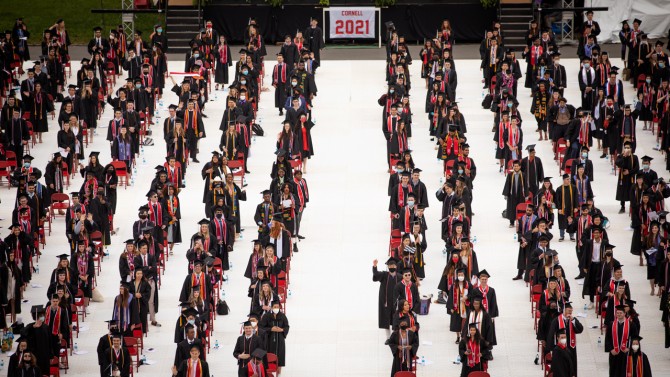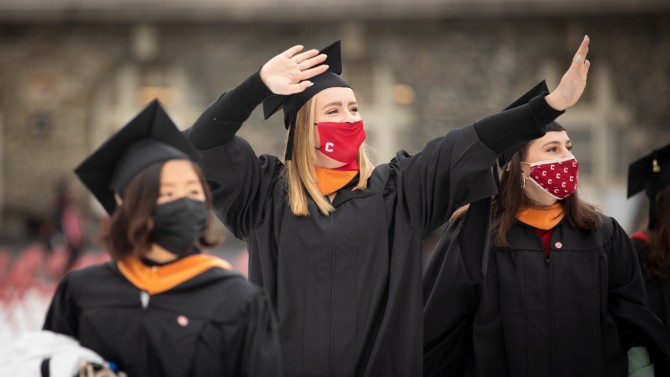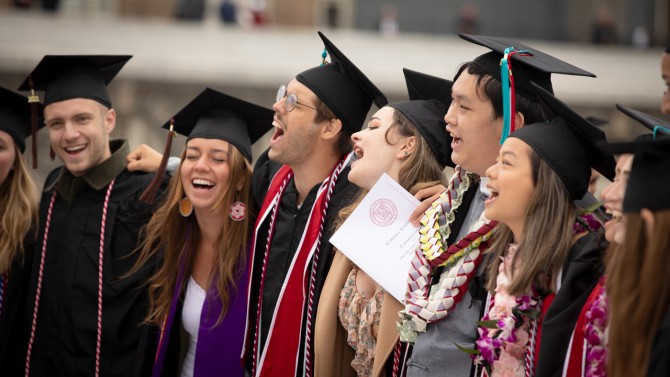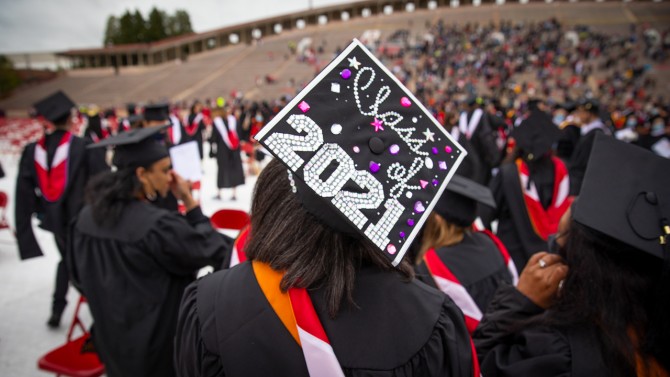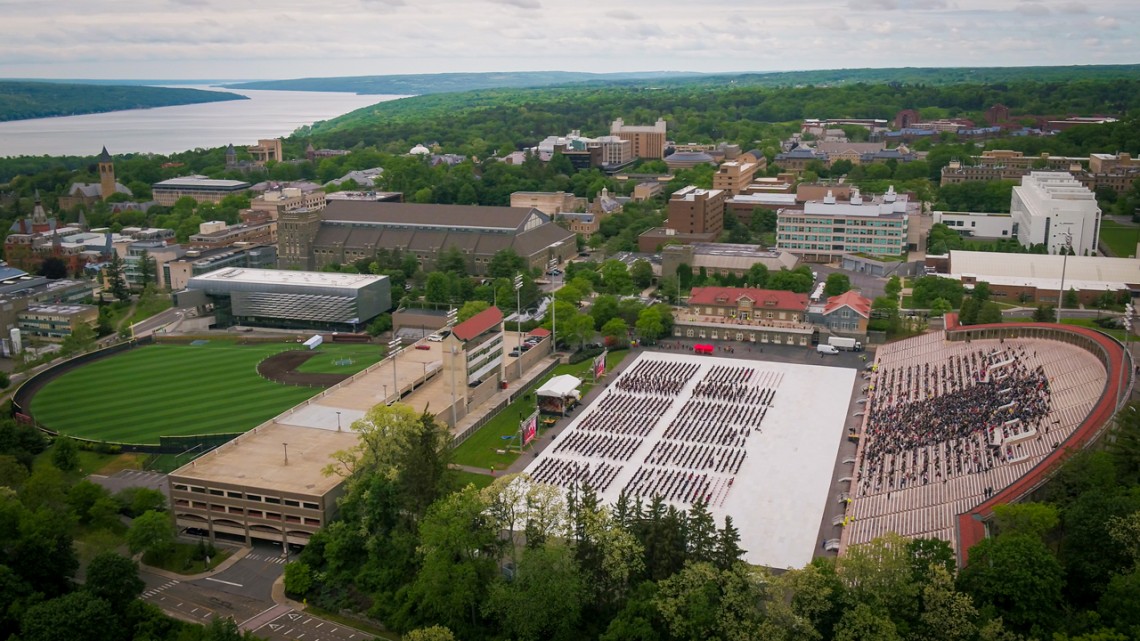
Four separate Commencement ceremonies were held at Schoellkopf Field May 29 and 30 for members of the Class of 2021 and degree recipients, in keeping with safety precautions and protocols related to the COVID-19 pandemic; each graduate was permitted to invite up to two guests.
Grads feted in person: ‘Where you were meant to be all along’
By Joe Wilensky
Across four separate Commencement ceremonies, President Martha E. Pollack lauded members of the Class of 2021 for their educational success in the face of a global pandemic that upended their lives – and for diligently adhering to the public health guidelines that helped pave the way for these in-person celebrations.
Adapting and enduring, under unprecedented circumstances, is a testament to who the graduates have become as Cornellians, Pollack said at the first of the four ceremonies, held May 29 and 30 under cloudy skies at Schoellkopf Field.
“This year has taught you the hardest, most important thing: How to stand back up when the world turned upside down. You do that by reaching out to help each other,” Pollack said. “I am so inexpressibly proud of every single one of you. Of what you’ve accomplished here as individuals, and together; of the way you’ve brought the ethos and the values of Cornell to life; and of the way you’ve come together to bring us to this point today.”
A total of about 4,500 graduates, joined by approximately 8,700 family members and guests, attended the four events celebrating the university’s 153rd graduating class, designed in keeping with Cornell’s ongoing COVID-19 safety protocols.
The first ceremony, held the morning of May 29 in an unseasonable chill, conferred degrees on candidates from the Graduate School, College of Veterinary Medicine and the College of Human Ecology.
Following the academic procession, the official ceremonies began, with University Marshal Poppy McLeod officiating. Provost Michael I. Kotlikoff welcomed the graduates, congratulating them on their behavior during the pandemic, including their adherence to the university’s public health and regular testing protocols.
Noting the dreary weather, Pollack said: “I’ve been to many, many graduations in my life, and one thing I learned long ago is no matter what the sky looks like, in everybody’s heart, graduation day is always a sunny day.” She paused to don a pair of sunglasses to a wave of applause.
Pollack asked all graduates to cheer for attending family members, and for the cameras livestreaming the event. “This is a football stadium that hasn’t had nearly enough noise this year,” she said. “In fact, there hasn’t been any noise here this year, and today’s the day we’re going to start making up for that.”
‘Celebration of a milestone’
“A commencement is a celebration of a milestone,” Pollack told the graduates. “It marks the moment that you cross the line between student and alum, between one phase of your life and another. This hour, here in Schoellkopf, is that liminal space. It’s where we stand together, on that line between what lies behind and what lies ahead – between the familiar past, and the unknown future.
“But this isn’t the first time we’ve stood there together,” she said.
Pollack described the decision university leaders made, 446 days previously (as of May 29), to close the university as the coronavirus spread across the globe. In its 155-year history, through wartime and unrest and even previous pandemics, Cornell had never before closed. That March 13, 2020 announcement “in retrospect we see as inevitable – in that moment, felt unthinkable,” she said.
She described the instant that nearly every student likely remembers in sharp detail: learning from the official email, or a text from a friend, that campus was shutting down for several weeks, that students were all being sent home, and that classes would be moving online for the remainder of the semester.
“And at that moment,” she said, “the world stood still.”
Despite the shock, anxiety and countless unknowns, students did what they had to do next – figuring out what to pack, where they were going and how to get there.
“And when you did get there, what you did was finish your semester,” she said. “On Zoom and on Canvas, by text message and FaceTime call, somehow you finished it all. You found new ways to be together, to learn, and to grow. When you found yourself in an unmapped future, you adapted your course, and then you adapted it again. And again. But every day, you moved forward.
“And today, here you are,” she said. “In caps and gowns, at Commencement – where you were meant to be all along.”
Pollack told the graduates that this likely won’t be the last time their lives are “turned upside down” by unexpected events. “The email will come, or the text message, or the conversation, or the news report – that will draw a new line between what was and what will be … Or you’ll face a decision that, whatever path you take, will change everything.
“And when that happens … I want you to remember something. Remember that you’ve been there before. Remember that you got through it. And remember how.”
Over these 14 months, Pollack told the students, “you held on to the kindness and support of one another, and you kept moving forward.”
The graduates are here today because of that commitment and hard work, she said, crediting Cornell’s faculty and staff, and students’ families, friends and communities, for helping to keep Cornell going. Students did their part: wearing their masks, keeping their distance, following safety protocols and regular testing requirements, and getting vaccinated as soon as possible.
“You chose, day after day and hour after hour, to put community first,” Pollack said. “And of all the countless decisions that have kept Cornell safe and healthy and moving forward – of all the data and expertise that went into these last 446 days – your decisions were the ones that mattered most.
“Nothing I did in Day Hall – no decision, no policy, no investment – nothing could have taken the place of a community willing to work together for its shared well-being,” she said.
And that, Pollack noted, is likely the most important lesson of all – and is “in every way entirely consonant with the ethos and the values of Cornell.”
A Cornell education, she said, has always sought to do far more than simply provide the knowledge necessary for a career. “It’s designed to teach you to how to live, and how to thrive, in a changing world,” she said. “And today, perhaps more than ever, our changing world demands much more than any specific set of knowledge.
“It demands the ability to communicate across difference, and to appreciate different points of view,” she said. “The willingness to tackle big, thorny problems, and to find answers to questions that were never in a textbook. … to learn how to learn – throughout a lifetime, as the world, and what there is to know in it, evolves.”
The challenges facing society will “demand not just knowledge, but a commitment to truth. Not just science, but the ability to listen to others, and to communicate what you know,” Pollack said.
Those challenges also will require a commitment, she said, “to do exactly what every single one of you has done here at Cornell: make the hard decisions that will enable all of us to move forward.”
She encouraged the graduates to come back soon, once the pandemic is over, and to visit often.
“I look forward to seeing many of you again at Reunions to come,” she said. “Cornell will always be a part of you, just as you, the extraordinary Class of 2021, will always be a part of Cornell.”
Media Contact
Abby Kozlowski
Get Cornell news delivered right to your inbox.
Subscribe